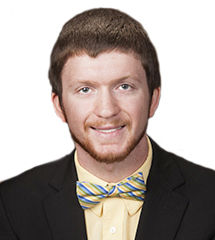2015 Presidential candidate: Benjamin Donovan

Presidential candidate
March 23, 2015
Major: Senior history and political science major and Spanish and philosophy minor
Involvement: SA director of Governmental Affairs, College Democrats president, University Honors Program fellow, Lambda Sigma Sophomore Honor Society senior adviser and member of two student advisory councils for political science majors
Q: What would be your No. 1 priority if elected?
A: The first one is definitely to get the bar-entry age lowered from 21 to 20. I’ve been working on that right now as director of Governmental Affairs. I think that there’s a real opportunity to make a substantial change in the combined DeKalb-NIU community in that regard. The other one is working with Student Involvement and Leadership Development. From the student perspective, a needed change would be a more beneficial and effective means of enforcing the new off-campus social policy that is mostly, primarily, affecting Greek houses, and working to address some of the issues with that rule.
Q: How would you help the SA connect more with students?
A: I think that really has to do with the makeup of our ticket. We’ve got me, I’m sort of the Student Association insider, I know how everything inside of the office is supposed to run and how it does run; then my vice-president Robert [Kreml], he’s a community adviser in New Hall, he has very strong connections with the Residence Hall Association, and we’ve already had a meeting with them, talking about some ways that they and the Student Association can work together … . I’m also currently pledging a fraternity, so provided that pledge process works out, that will be way to work with and keep that community integrated, you know, reaching out to them; and Gladys [Sanchez], our treasurer candidate, is a non-traditional student. She’s very heavily involved with non-traditional student groups on campus, and the Non-Traditional Student Services Department, and we’re hoping to be in lockstep with them as well to make sure that the Student Association is getting the word out to everybody in those three major demographic groups on campus.
Q: What do you see as the main cause or causes behind NIU’s declining enrollment? How can the SA help combat these problems?
A: So, I think the root of the problem is a plethora of factors driving inequality: houses becoming more expensive for more people, etc. And I think a lot of people have a lot of misconceptions about Northern that I don’t really think the institution deserves. You know, a lot of people think Northern’s a sub-par institution, or that it’s everybody’s last pick; and I would never deny that there are certainly some people who do fit into that, where they’re at Northern because they didn’t get into anywhere else. I’m sure that happens, and that’s unfortunate, but I don’t think it’s something that people should get upset about. I think the remedy, for the SA and for other organizations, is just to go out to high schools and talk about all the opportunities we have because we do have nationally ranked programs here. We’ve got really awesome academics, really awesome teachers and opportunities here.
Q: Could you name an issue you believe NIU is facing and describe how the SA could help the university resolve it?
A: So, this might be a little abstract, but bear with me … I think a big problem that we have is student apathy, and I think it kind of stems from the stigma NIU has as being a sub-par institution. I think that one possible solution would be to talk to the [office of First- and Second-Year Experience], and see if there is a way to get the Student Association or [Student Involvement and Leadership Development] or student [organizations] into the orientation curriculum — that was my original thought, but now that orientation’s going to be a two-day endeavor, I don’t know how viable that is because we wouldn’t want to overload incoming students with new information. The other possible remedy that we’ve been talking about has been maybe working with First- and Second-Year Experience, and the office that’s doing the Plus gen. ed reform — maybe seeing if the Student Association or SILD have a day within the UNIV 101 or 201 classes since they’re now going to be required for all students. We could talk about the benefits not only of the institution, but also about the benefits of the institution from a student perspective — the benefits of joining a student organization, and the benefits of working with a committee in governance and how student participation in all of these things can positively impact the individual student and the larger university.






